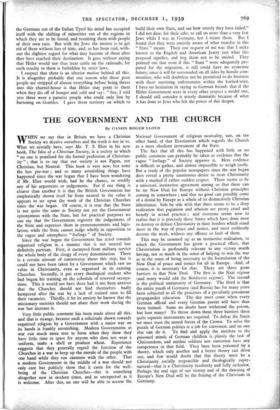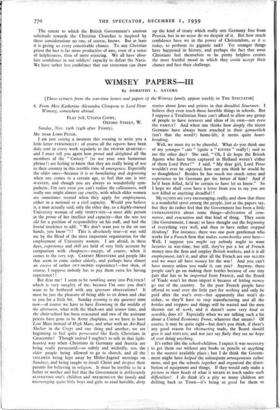THE GOVERNMENT AND THE CHURCH
By CANON ROGER LLOYD
WHEN we say that in Britain we have a Christian Society we deceive ourselves and the truth is not in us. What we actually have, says Mr. T. S. Eliot in his new book, The Idea of a Christian Society, is a society in which " no one is penalised for the formal profession of Christian- ity " ; that is to say that our society is not Pagan, not Christian, but Neutral. This book is very new, but none the less pre-war ; and so many astonishing things have happened since the war began that I have been wondering if Mr. Eliot would wish, had he the chance, to modify any of his arguments or judgements. For if one thing is clearer than another it is that the British Government has emphatically shown itself far from neutral in the value it appears to set upon the work of the Christian Churches since the war began. Of course, it is true that the State is not quite the same as Society nor yet the Government synonymous with the State, but for practical purposes we can say that the Government registers the judgements of the State and expresses them in pronouncements and legis- lation, while the State cannot judge wholly in opposition to the vague and amorphous " feelings " of Society.
Since the war began the Government has acted towards organised religion in , a manner that is not neutral but definitely partisan. First, it exempted from military service the whole body of the clergy of every denomination. There is a certain amount of controversy about this step, but it could not have been taken by a Government which saw no value in Christianity, even as organised in its existing Churches. Secondly, it put every theological student who had begun his training on the schedule of reserved occupa- tions. This it would not have done had it not been anxious that the Churches should not find themselves badly hampered after the war by a lack of trained men to fill their vacancies. Thirdly, it let its anxiety be known that the missionary 'societies should not abate their work during the war but increase it.
. Very little public comment his been made about all this, and that is strange, because such a solicitude shown towards organised religion by a Government with a major war on its hands is frankly astonishing. Modern Governments at war run much more true to form when they show they have little time to spare for anyone who does not wear a uniform, make a shell or produce wheat. Experience suggests that they generally regard the function of the Churches in a war to keep up the morale of the people with one hand while they run canteens with the other. That a modem Government in the middle of a war should not only care but publicly show that it cares for the well- being of the Christian Churches—this is something altogether new in modern times, and as unexpected as it is welcome. After this, no one will be able to accuse the National Government of religious neutrality, nor, on the other hand, of that Erastianism which regards the Church as a mere obedient instrument of the State.
The fact that all this has happened with little or no public comment can probably be taken as evidence that the vague " feelings " of Society approve it. Here evidence is difficult to gather, and almost impossible to weigh justly. But a study of the popular newspapers since the war began does reveal a pretty unanimous desire to treat Christianity with a marked if rather sudden respect. There seems to be a universal, instinctive agreement among us that there can be no New Deal for Europe without Christian principles coming in somewhere ; and that no good can possibly come of a denial by Europe as a whole of its distinctively Christian inheritance. Side by side with that there seems to be a deep realisation that paganism and atheism are pretty cruel and beastly in actual practice ; and everyone seems now to realise that it is precisely those States which have done most to destroy or debase Christianity in their borders which stand most in the way of peace and justice, and most ruthlessly destroy the weak, without any offence or fault of them.
This may be summed up as an instinctive realisation, to which the Government has given a practical effect, that Christendom is profoundly relevant to any victory worth having, not so much in the sense of helping to win the war as in the sense of being necessary to the formulation of the New Deal of peace and justice for all in Europe. And, of course, it is necessary for that. There are three great barriers to that New Deal. The first is the Nazi regime (and many would add the Bolshevist regime). The second is the political immaturity of Germany. The third is that the entire youth of Germany (and Russia) has for many years been subjected to all the processes of a peculiarly poisonous propagandist education. The day must come when every German official and every German parent will have thus been trained. Some no doubt have withstood the poison, but how many? To throw down these three barriers three quite separate instruments are required. To defeat the Nazis we must trust the armed forces of the Crown. To solve the puzzle of German politics is a job for statesmen, and no one else can do it. To find and apply the antidote to the poisoned minds of German children is plainly the task of Christendom, and neither soldiers nor statesmen have any competence in that field. They have been poisoned by a theory, which only another and a better theory can drive out, and few would doubt that this theory must be a Christianity socially responsible and theologically super-, natural—that is a Christianity resolutely and fully orthodox.' Perhaps the real sign of our victory and of the dawning of Europe's New Deal will be the freeing of the Christians in Germany. The extent to which the British Government's anxious solicitude towards the Christian Churches is inspired by these considerations no one, of course, knows. But at least it is giving us every conceivable chance. To any Christian priest the fact is far more productive of awe, even of a sense of helplessness, than of mere rejoicing. We all have abso- lute confidence in our soldiers' capacity to defeat the Nazis. We have rather less confidence that our statesmen can draw up the kind of treaty which really sets Germany free from Prussia, but in no sense do we despair of it. But how much confidence have we in the power of Christendom, as it is today, to perform its gigantic task? Yet stranger things have happened in history, and perhaps the fact that most Christians feel themselves to be pretty helpless creates the most fruitful mood in which they coulci accept their chance and face their challenge.













































 Previous page
Previous page